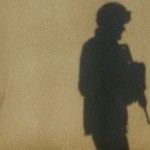A Gay Officer at War
 While I served in Afghanistan, the American “cultural war” exploded with California’s Proposition 8 and the pending discharge of an 18-year decorated combat pilot under 'Don’t Ask, Don’t Tell'.
While I served in Afghanistan, the American “cultural war” exploded with California’s Proposition 8 and the pending discharge of an 18-year decorated combat pilot under 'Don’t Ask, Don’t Tell'.
RD is the pseudonym of a 10-year armed services veteran recently returned from Afghanistan. A psychologist and long-serving veteran, this officer had to deal with both the traumas of the troops in front of him, and the psychic wound of his own situation: the risk that if he spoke frankly about his life to any colleague, he could find himself ejected from the war and the army. This is the first in a series of excerpts from his journal.
This journal began as an attempt to capture what it is like to deploy in Afghanistan.
The first surprise is how extensive the waste, fraud and soldier frustration is because of the rigid Pentagon bureaucracy. What I found was how the military wastes millions of tax-payer dollars every year while degrading military readiness. I was stunned by how much was wasted because it was “the wrong color money”; because “if we don’t spend it we won’t get it next year” and because “the rules say so” – not so much because something actually improved our war-fighting ability.
I was shocked at how many hours and days were wasted on “mandatory training” that duplicated training I already received but was not accepted because the training was Air Force (and I was with the Army) or Army (and I was with the Air Force). In fact, as I write this introduction I am still in Afghanistan without an M16. The reason? Because I qualified on an Army range and the Air Force does not recognize Army training. I also lack access to the military’s secure secret internet protocol network and, you guessed it - because my computer security training was through the Air Force - which the Army does not recognize. As a result I am at a small remote post in a combat zone without an M16 and without secure means of communicating with my Commander. I am continually amazed at how dysfunctional the bureaucracy can be.
A second surprise is how inefficient and corrupt everything appears to be in Afghanistan. The natives routinely overcharge Americans by outrageous amounts even for work projects that benefit solely the Afghan people, with often shoddy results. Yet Americans continue to do business with Afghanis in an effort to “win their hearts and minds” but as soon as the money dries up – so does the loyalty. During my time in Afghanistan it has become increasingly clear that our victory hinges largely on buying the loyalty of locals through large infusions of U.S. tax dollars into the hands of corrupt local officials.
And last, the third surprise is how the religious fundamentalists in Afghanistan are strikingly similar to religious fundamentalists in America – who are also trying to force their literal interpretation of Holy Scripture onto everyone else through laws. While I served in Afghanistan the American “cultural war” exploded with California’s Proposition 8 and the pending discharge of an 18-year decorated combat pilot under “Don’t Ask, Don’t Tell”.
A psychologist is also allowed to roam almost anywhere on a military post in Afghanistan – part of my job is to walk around and get to know people. As a result I have access to Artillery, Infantry, Medics, Logistics and every other area on post. My job is to get to know soldiers, assess the stresses they are under and make recommendations to Command on how to reduce combat and operational stress. Of course I also meet individually with soldiers for traditional counseling sessions, and in these sessions soldiers here in a combat zone would open up and share their innermost thoughts and concerns. I was honored to be here with them. As a result I heard their own thoughts on the war, on locals, and on their own battles with bureaucracy and waste. I was also there with them to see everything for myself – a chief reason why I traveled to the various remote combat outposts. Soldiers would often invite me to travel with them on foot patrols in the mountains and villages of Afghanistan and I always tried to accommodate them.
I enjoyed my time with them. The men and women of the United States Army are some of the finest people on Earth. They consistently exhibit a “can do” attitude even in the most difficult of circumstances and accomplish feats which far exceed reasonable expectations; and they do so without complaining. What is truly amazing is that these outstanding soldiers are so often in their late teens and early twenties. They are absolutely incredible, but then isn’t that why we call them “Heroes”?
More to come…